Welcome
....to JusticeGhana Group

JusticeGhana is a Non-Governmental [and-not-for- profit] Organization (NGO) with a strong belief in Justice, Security and Progress....” More Details
Zimbabwean author NoViolet Bulawayo: 'I like to write from the bone'
- Details
- Category: Books
- Created on Saturday, 25 July 2015 00:00
- Hits: 8479
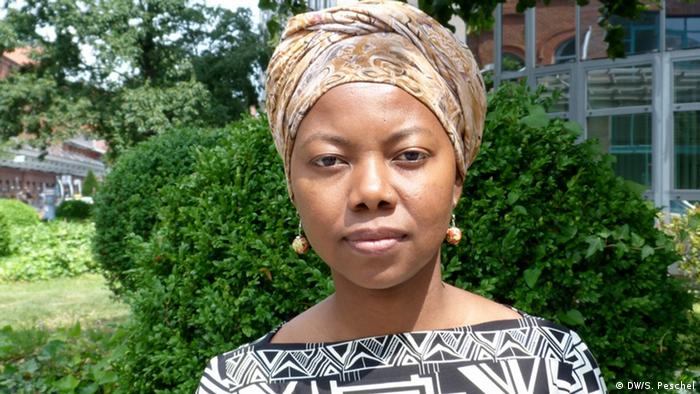 Zimbabwean author NoViolet Bulawayo: 'I like to write from the bone'
Zimbabwean author NoViolet Bulawayo: 'I like to write from the bone'
Writing about Zimbabwe while living in the US has changed her language and her identity, says NoViolet Bulawayo, the author of "We Need New Names." DW met up with the young African writer on her first visit to Germany.
Ms. Bulawayo, you teach fiction at Stanford University. How do your colleagues and students address you?
NoViolet. That's the name I go by. Elizabeth Tshele, even though it's my birth name, is the name that is just in my official documents. I like to remind people that I come from a culture where you grow up with quite a bunch of names.
Why did you choose this name, NoViolet Bulawayo?
It's from my mother's name, actually. My mother was named Violet. She passed away when I was 18 months old, and she wasn't really spoken about that much. I grew up with a sense of something missing. I decided when I was at a certain age to honor her. "No" in my language means "with." Of course Bulawayo is my city, my hometown. And being in the US for about 13 years without being able to go home made me very homesick. So it was my way of staying connected.
Why do we need new names?
I wrote the novel at a specific time of my country's history. Recent history, I should say, when the country was coming undone, due to failure of leadership. And by saying "we need new names" I was speaking for the need for us as a people to sort of re-imagine, rethink ourselves, rethink our way, think about where we were going. We needed new ways of seeing things, new ways of doing things, new leadership. It was basically a call for renewal. But it should not be confined to Zimbabwe. I believe you can translate across borders.
Many readers think your novel "We Need New Names" is strongly autobiographical. Or is it not?
Not as much as most people think. There are parts of me as in most of my work. I like to write from the bone. Even if it's just a small part I feel like it gives my work the certain charge. The first half of the novel does not have much of me. Darling, the narrator and main protagonist in Zimbabwe, does not have a strong connection with me. My childhood was very normal and beautiful. Zimbabwe in the 80s was this land of promise. We grew up as kids in working countries grow up - because the country at that time was really functional.
But as Darling does not know the stability my generation enjoyed and experienced, her childhood is really under pressure. So it is when she crosses the border to the US that our stories started to sort of intersect. I actually allowed her to borrow from mine, because I kind of know what it is like to be an outsider. To be an immigrant, to struggle with fitting in, find my way in a new space. But even in that part of the novel I didn't set out to write an autobiographical text. The language you chose for your protagonists, the children who live in Paradise, is a mixture of African and English vocabulary, neologisms, incantations, curses. How did you find this strong and colorful language?
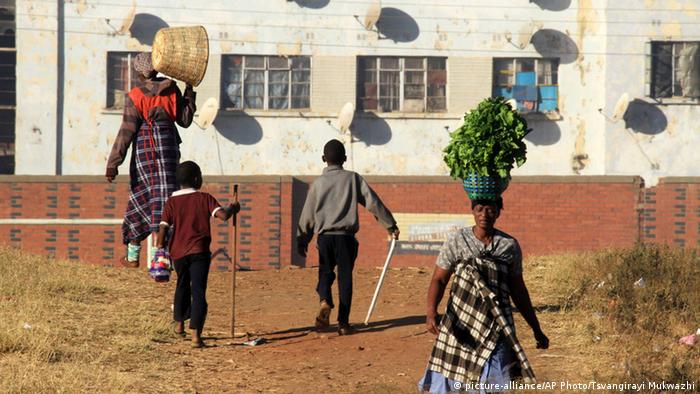
I'd say I'm indebted to my culture. I grew up in a space where language was alive. Language was currency. I wanted to write a book that captured that, that would resonate especially with readers coming from that space. And a part of it also came from the fact that I was raised by storytellers, especially my father and my grandmother, of course the women who stayed home when I was growing up, they talked, they gossiped. So I was very conscious of language as a living beast. I wanted the book to be a celebration of that. I wanted that color and that texture and that pulse present.
Is this the language that clearly expresses a mixed, confused identity?
I wouldn't say it's a confused identity. I would say it's an identity that comes from negotiating two cultures. English came to Zimbabwe as with most African countries through colonization.
What language did you grow up with?
I grew up with Ndebele, and then English was there, somewhere, it's a language that we encountered in school. I wouldn't bring English home; my father would not allow it. And looking back now as an adult I think it is a good thing because it cemented my relationship with my language.
Now, when it comes to me writing I'm juggling two languages, obviously, Ndebele is my ancient language, the language of intimacy. And as much as I'm fine with communicating in English it doesn't have that weight for me. But of course I have to produce a book that looks like English on the page. So it takes me back to that point of negotiating. And of course there is the love of language. I really want my language to be in my work. So I come to it through a process of translation.
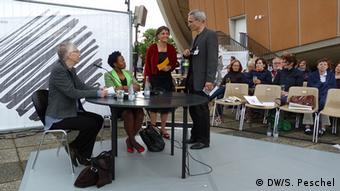 In the second part of your book, when your protagonist Darling is in the United States, the language is pale, less colorful, and to describe the life she leads you make use of stereotypes and clichés. Is this an expression of that she loses her identity, or part of it?
In the second part of your book, when your protagonist Darling is in the United States, the language is pale, less colorful, and to describe the life she leads you make use of stereotypes and clichés. Is this an expression of that she loses her identity, or part of it?
Whenever somebody crosses geographical spaces, whenever we cross cultures, something is lost. I remember just from my own experience that I spent the first year in the US in silence. I moved from being one of the noisiest kids in class to being the quietest. And I was dealing with all kinds of things, especially culture shock and failure to access the language. So that is exactly what is happening to Darling. Part of her identity is tied to space. So without her language and without the specific group of people she interacts with, she has to become a different person.
And I know readers complain about that, but I feel like they sort of need to think deeper about what's happening to Darling. Language is one way that disconnection kind of manifests itself. And I hear this from immigrants that I meet in the US, even older ones who have been in the US for so many years, that they are struggling with language.
This naturally leads to the question: Are you a Zimbabwean, an African or an American author?
I'm a Zimbabwean author, and by extension I'm an African. So that makes me an African author, just like I'm an African woman. But of course we have to add that Africa is a big monster of space. It's not singular in any way. So as much as we claim some of these identities, they are also not small. When I think about those identities, especially as somebody who is writing outside, I'm thinking in terms of representation, in terms of how important it is for the young generation of would-be writers, the ones who are going to be writers in the next 10, 15 years, to face the fates like mine in a space that has been dominated by other races and other cultures. That's why I'm quite comfortable claiming those identities.
American not so much, I've lived there for 14, 15 years. To begin with, I still don't hold American papers, even though I'm working towards it. So that's one way that kind of puts you in the margins, puts anybody in the margins. It complicates the way that you imagine your identity. I arrived in the US when I was 18 - I spend my very late teens and 20s there. And that has left its fingerprints on who I am.
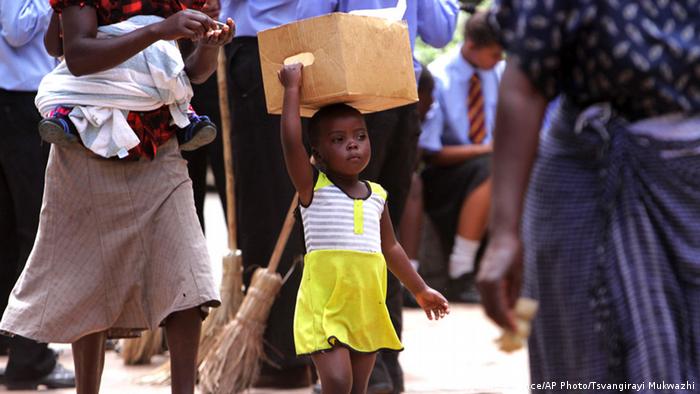
You mention "Shitty former Rhodesia" and late in the novel "Zim," but you never clearly say that Paradise, the slum the children you write about live in, is in Zimbabwe. Why don't you address Zimbabwe and its political problems or Mugabe directly?
I felt it wasn't necessary. I felt the context was there. We all know that it is Zimbabwe. Part of why I left it like that is it's not specifically a Zimbabwean story. It has happened in a lot of places in the world and is going to happen. So I wanted it to have this kind of universal aspect to it. Sometimes when you name a thing it arrests people's imagination and perceptions.
I'll mention, though, that the first drafts of the novel were actually naming Zimbabwe, and they addressed Mugabe. The draft was not in Darling's voice, it was in an older peasant's voice. So you can imagine it was very political. There was a lot of an angry NoViolet in there. It started to kill the story after a while, and I sort of had to pull back and introduce a young narrator and also take the politics out of it. In this version I think the politics are still there, but this is not blocking the story.
It took you 13 years to be able to return to Zimbabwe. Why so long?
Well, because the life of an immigrant is hard, especially in the West. For me it was a mixture of not to being able to return because I was in school all that time. And then there was also a time when things were unstable in Zimbabwe. Two years after I came, I first had the opportunity to go back, and I was like, well, I'll go in a couple of years, there is no hurry. And then of course in a couple of years things started to go bad and you just didn't know what was going to happen. I kind of stayed away out of uncertainty. And of course your friends and family on the ground would say, just stay there until this country sorts itself out.
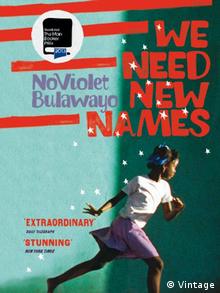 So, are things in Zimbabwe sorting themselves out now?
So, are things in Zimbabwe sorting themselves out now?
They are not as desperate as they were when I was writing "We Need New Names." Then we really were at the height of our crises. Now we still have the same government in power but things are quiet - we don't have the violence that characterized especially 2008, 2009. Inflation is sort of stabilized, we are using the US dollar. The complication there is that not everybody is able to get their hands on them. People's wages are really not the greatest, but people are resilient, they are surviving. I'm really inspired and in awe of how people are able to hold it together and try to live regular lives. I don't know how they do it, but it is really not as desperate. It could be better but it is nothing compared to where we are coming from.
Migration is the central theme of your book. You are here in Europe and in Germany for the first time. In these last few months, hundreds of thousands of refugees have tried to leave Africa and cross the Mediterranean or thousands of kilometers of land to come to Europe. Many lost their lives. What do you think or feel when you see reports on this?
It is a saddening and frustrating situation, saddening in the sense that people make the difficult decision to leave and face death - because that is what this trip is. Of course you are looking for greener pastures, but people know that death is part of the equation. The frustration comes from the fact that African governments have failed their people to that extent that they have to make these difficult choices.
Another part of the frustration comes from the fact that the international community has until recently, when the situation got out of hand, done nothing when people could have been helped. There was a time when governments were like, "Hey, you get in the boats - you're on your own." I think it is time we looked at our humanity and realize that the world is really becoming more global. It is time to find a way to help each other. Because the reality is that those people are not going to stop coming. The question is, what do we do?
Date 15.07.2015
Author Interview: Sabine Peschel
Source: Deutsche Welle




